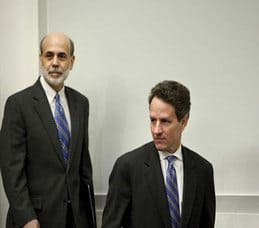
What are the responsibilities of the Federal Reserve?
The Federal Reserve is often talked about as the Government’s and The Banker’s Bank. Its responsibilities include:
- Controlling the supply of money in the US economy, and through monetary policy aims to obtain full employment and stable prices. This is the responsibility that you will hear the most about and you can learn more about in our full article on the Fed.
- Acting as the “Banker’s Bank”. Through the 12 district Federal Reserve banks and their 25 branches the Federal Reserve System is responsible for the nation’s payments system and acts as the lender of last resort for member banks.
- Acting as the “government’s bank”, selling Treasury securities, running the treasury auction process on behalf of the Treasury Department, and investing money raised through auctions and tax collection until it is needed by the government.
- Acting as a regulator overseeing and supervising the banking system. This is a responsibility which, depending on the type of bank, the Fed shares with the US Treasury and other Government regulators such as the SEC.
Once the expenses of the Fed are paid any remaining money is paid to the US Treasury. The Federal Reserve is actually very profitable as it receives interest on the trillions of dollars in treasuries and other types of bonds it holds in its portfolio.
What are the responsibilities of the US Treasury?
The US Treasury is similar to the finance and accounting department at a public company. It is responsible for managing the government’s finances. Its responsibilities include:
- Raising revenues for the government by collecting taxes. (The IRS is part of the US Treasury).
- Enforcing finance and tax laws by investigating and prosecuting tax evaders.
- Paying the bills of the government
- Managing the Government’s Debt
- Printing of money and coinage. (The Fed is responsible for the money supply, the Treasury is responsible for the production of the actual bills and coins).
- Advising the government on international financial, monetary, economic, trade and tax policy
- Regulating and ensuring the stability of the banking system
How do the responsibilities of The Fed and the US Treasury Overlap?
As you can see from the above the responsibilities of the Fed and the Treasury overlap in many areas. Both have the responsibility of supervision of the banking system and maintaining the stability of the financial system as a whole. They are at the center of the US Economy with the US Treasury responsible for the day to day financial activities of the US Government, and the Fed responsible for the overall smooth functioning of the economy as a whole.
Have a question about the treasury or the Fed the we didn’t answer? Leave a comment below and we will be happy to respond.
Trusted & Regulated Stock & CFD Brokers
What we like
- 0% Fees on Stocks
- 5000+ Stocks, ETFs and other Markets
- Accepts Paypal Deposits
Min Deposit
$200
Charge per Trade
Zero Commission on real stocks
64 traders signed up today
Visit Now67% of retail investor accounts lose money when trading CFDs with this provider. You should consider whether you can afford to take the high risk of losing your money.
Available Assets
- Total Number of Stocks & Shares5000+
- US Stocks
- German Stocks
- UK Stocks
- European
- ETF Stocks
- IPO
- Funds
- Bonds
- Options
- Futures
- CFDs
- Crypto
Charge per Trade
- FTSE 100 Zero Commission
- NASDAQ Zero Commission
- DAX Zero Commission
- Facebook Zero Commission
- Alphabet Zero Commission
- Tesla Zero Commission
- Apple Zero Commission
- Microsoft Zero Commission
Deposit Method
- Wire Transfer
- Credit Cards
- Bank Account
- Paypall
- Skrill
- Neteller
What we like
- Sign up today and get $5 free
- Fractals Available
- Paypal Available
Min Deposit
$0
Charge per Trade
$1 to $9 PCM
Visit Now
Investing in financial markets carries risk, you have the potential to lose your total investment.
Available Assets
- Total Number of Shares999
- US Stocks
- German Stocks
- UK Stocks
- European Stocks
- EFTs
- IPOs
- Funds
- Bonds
- Options
- Futures
- CFDs
- Crypto
Charge per Trade
- FTSE 100 $1 - $9 per month
- NASDAQ $1 - $9 per month
- DAX $1 - $9 per month
- Facebook $1 - $9 per month
- Alphabet $1 - $9 per month
- Telsa $1 - $9 per month
- Apple $1 - $9 per month
- Microsoft $1 - $9 per month
Deposit Method
- Wire Transfer
- Credit Cards
- Bank Account



